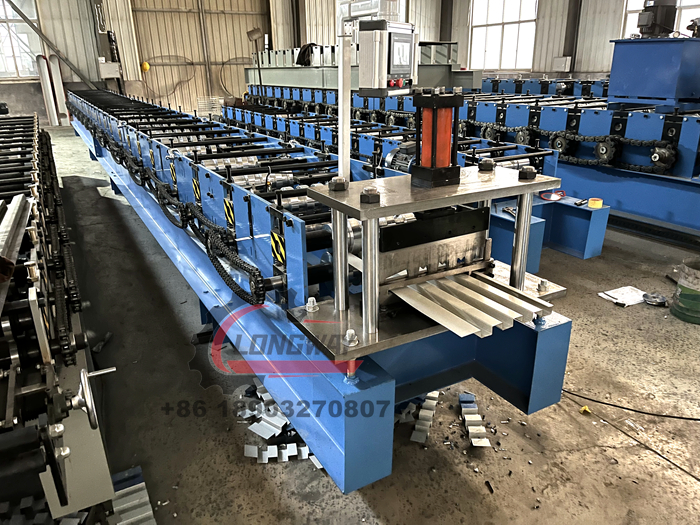Square Downpipe Roll Forming Equipment Manufacturer for Efficient Production Solutions
The Rise of Square Downpipe Roll Forming Machines in the Construction Industry
In the rapidly evolving construction industry, efficiency and precision play pivotal roles in determining the success of any project. One of the standout innovations contributing to this evolution is the square downpipe roll forming machine. This sophisticated equipment has become an essential tool for manufacturers aiming to produce high-quality downpipes while optimizing their production processes.
Understanding Square Downpipes
Square downpipes serve a crucial function in building drainage systems, efficiently channeling rainwater from roofs to the ground. Unlike traditional circular downpipes, square designs offer several advantages, such as improved aesthetic appeal and easier integration into modern architectural designs. The production of these downpipes must adhere to high standards of durability and structural integrity, making the roll forming process an ideal method for their manufacture.
The Roll Forming Process
The roll forming process involves passing a continuous strip of metal through a series of rollers that progressively shape it into the desired profile. This method allows for high-speed production and minimal material waste, as the process can be adjusted to provide precise dimensions and shapes consistently. For square downpipe production, specialized roll forming machines are designed to create the square profile efficiently. These machines can handle different materials, including galvanized steel, aluminum, and stainless steel, making them versatile for various applications.
Advantages of Square Downpipe Roll Forming Machines
1. High Efficiency These machines operate at impressive speeds, enabling manufacturers to produce large quantities of square downpipes in a short period. This efficiency is critical in meeting the tight deadlines often associated with construction projects.
2. Consistency in Quality The precision engineering of roll forming machines ensures that every downpipe produced meets stringent quality standards. This consistency reduces the likelihood of defects, ultimately leading to lower rejection rates during quality control checks.
3. Customization Options Modern roll forming machines can be integrated with advanced technology to allow for customized lengths, widths, and thicknesses. Manufacturers can easily adapt to changes in design specifications, enabling them to cater to diverse client needs without investing in multiple machines.
square downpipe roll forming machine company

4. Reduction in Material Waste Traditional manufacturing methods often lead to significant material waste. However, roll forming minimizes waste by optimizing the use of raw materials. This not only benefits the environment but also reduces material costs for manufacturers.
5. Durability and Strength Square downpipes produced with roll forming machines exhibit superior strength due to the cold-forming process, which enhances the material’s mechanical properties. This durability ensures that the downpipes can withstand various weather conditions and prolonged use without failing.
Choosing the Right Roll Forming Machine Company
With numerous companies offering square downpipe roll forming machines, selecting the right one can be challenging. When evaluating potential suppliers, manufacturers should consider several factors
- Experience and Reputation Companies with a proven track record in the industry are more likely to provide reliable machines and support services. Checking customer reviews and case studies can provide insights into their reputation.
- Technology and Innovation The best roll forming machine companies invest in modern technology and continuously seek to innovate their equipment. This ensures that their machines remain competitive in terms of performance and efficiency.
- After-Sales Support A strong after-sales support system is crucial for maintenance and troubleshooting. Manufacturers should choose companies that offer comprehensive support, including training and parts replacement.
- Customization Capabilities Evaluate if the company can accommodate specific design requests or modifications as they arise. This flexibility can be invaluable in a dynamic market.
Conclusion
Square downpipe roll forming machines represent a significant advancement in the construction industry, enabling manufacturers to produce high-quality products efficiently and sustainably. As the demand for aesthetically pleasing and functional architectural elements continues to grow, these machines will likely play an even more critical role in shaping the future of building construction. By understanding the benefits and best practices for choosing a production partner, manufacturers can ensure their competitive advantage in this ever-evolving landscape.
-
Key Features to Look for in a Roof and Wall Panel MachineNewsMay.23, 2025
-
Key Features of a Roller Shutter Door Forming MachineNewsMay.23, 2025
-
Key Features of a Purlin Roll Forming MachineNewsMay.23, 2025
-
Key Features of a Cut to Length & Slitting LineNewsMay.23, 2025
-
Benefits of Using a Downspout Gutter Forming MachineNewsMay.23, 2025
-
Advantages of Using a Steel Deck Floor Roll Forming MachineNewsMay.23, 2025
-
Revolutionize Your Gutter Production with a Gutter MachineNewsMay.23, 2025








